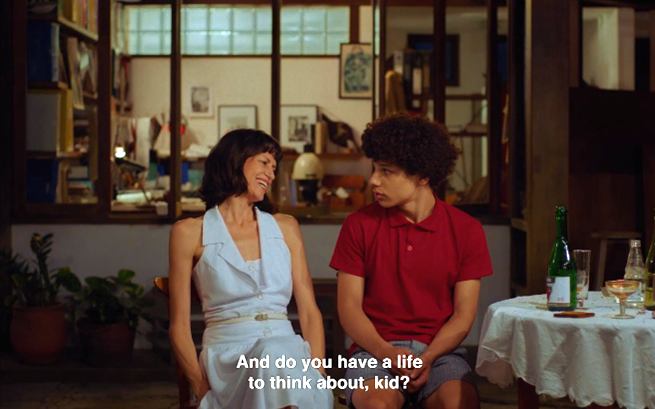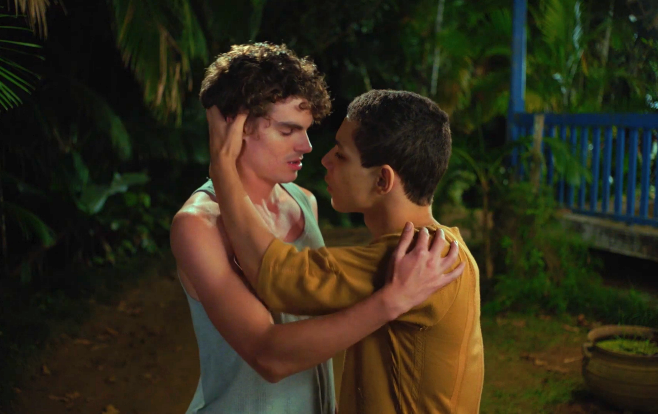from the other side of the lens
by Douglas Messerli
Rodrigo de Oliveira (screenwriter
and director) Os Primeiros Soldados (The First Fallen) / 2021
Suzano, a gay man, has evidently a reputation for his wonderful drag
performances, and his nephew, also gay it appears, is cautious about his
uncle’s question whether or not he’s planning to perform in drag in evening,
arguing that he could never be as “beautiful” as his uncle was, attempting to
get an answer of why Suzano is not planning on performing or perhaps even
attending the event at the local gay bar Genet. He provides no answers but does
award Muriel with a lovely red bolt of tulle which he might wear for the
evening if he wants.
Muriel’s mother and Suzano’s sister, Maura works as a nurse, and
evidently on her way to work is involved in a traffic backup. Apparently a
transgender figures, Rose (Renata Carvalho) we later perceive her to be, has
punched out the window to a bus and is still in the process of verbally abusing
the bus driver and police who attempting to calm her when Maura, getting out of
the car after recognizing Rose as a friend of her brother’s, intervenes. The
problem it seems is that she has been refused to even be seen at the local
hospital where Maura works. She is ill and worried, but they won’t treat her.
Maura assures her that she will look into the matter.
Something seems akilter. As on-line critic Brent Marchant observes:
“It can be terrifying to know that
something is wrong but not know what it is. So it was for many in the LGBTQ+
community in the early ʼ80s….”
He goes on to argue that Os
Primeiros Soldados treats these scenes too subtly, perhaps too cryptically
which results it the audiences’ confusion.
That night in 1983 in Vitória, Rose
performs, after several years silence, once again for the last time, singing a
song too sad to even finish before the others shout and scream the New Year in.
Her dear friend Humberto (Victo Camilo) is filming the entire show, and
afterwards meets a young man from his hometown with whom he immediately falls
in love, but with whom, despite their deep kisses, refuses to have sex.
Suzano, to everyone’s disappointment is a no-show, telling his friend of
Joca (Higor Campagnaro) that he is planning to return to Paris that very
evening, his wealthy lover having provided a return ticket. Joca does not
believe him. Nor do we, observing Suzano visiting a small cottage in the jungle
where he lights a fire, scratches out the countries on a map as they celebrate
the New Year’s, and sets off fireworks near the small cottage—a tiny ranch, we
later learn, is owned by Suzano.
Maura has heard from her brother occasionally in quick calls from Paris,
one of which we overhear, Suzano
evidently calling from a pay phone (for my younger readers, there once were
such things in the street, stationery telephones in which one could communicate
with others), refusing to provide his sister with his number. He tells her that
his studies are going nicely, although he misses her and Muriel, and asks his
nephew to write him more regularly, the letters taking some time to reach him.
Muriel has grown and is planning his own celebration this New Year’s at
the club. A girlfriend helps him pick out the right outfit to wear, and as good
luck he throws a sash of the red tulle fabric that Suzano had given him.
Unfortunately, the boy has no transportation, his mother working as a night-nurse. By the time Maura hears what has happened and rushes to the clinic, Muriel sits alone in a small front, brightly lit waiting space, while the doors to the clinic itself have been locked by the doctors who have fled in a hurry. Only a nurse is left within, unable to open up what can only now be described as “the cells,” the doctors having taken the keys with them in their flight. Even Maura’s outrage as a fellow nurse gets her nowhere. As the returning doctor explains the next morning, the small clinic of two doctors serves over 300 patients; but the government would have immediately closed it down if they knew it had been visited by a man who died of the still unnamed “plague.”
A will is found, leaving the “ranch” to
Muriel and asking that Suzano’s ashes be scattered at a stream on the little
ranch.
As I have hinted, time in this film is
delusional. And all that we have witnessed so far represents only the first
half of this one hour and 47-minute film.
When Maura and Muriel bring the ashes to Suzano’s hidden cottage they find Rose and Humberto living there, having also been suffering through the year with Suzano of AIDS. The rest of the film reveals how the trio, broken free from society, attempt to survive with the help of funds sent from Paris by Adrien, drugs provided via the Paris black market sent to the local Vitória post box, with a complete medical set up where the three patients daily log in their weights, new cancerous growths, mental delusions, diets, and psychological conditions along with a regimen of regularly filming themselves as specimens and at play. They suffer each other’s heartbreaks—for one entire day Suzano wakes up and cannot remember where or why he is before the next day all turns to normal—and numerous fears. They have gathered drugs from Russia that will kill them if the pain becomes too serious, giving them over to Humberto, the newest refugee, to hide, commanded to bring the store of boxes out from hiding only if he can determine that their desire to die is with a reasoned mind.
It is at this point in the film when Suzano returns to the bar, dying in
the process to revisit Muriel and his mother.
Of all the many AIDS films I have seen, this is one of the best and
certainly the post positive; but then de Oliveira’s film has the advantage of
being able to look back through the other side of the lens at these “first
fallen,” the first soldiers in the never-ending battle against AIDS.
Los Angeles, October 17, 2022
Reprinted from World Cinema
Review (October 2022).










No comments:
Post a Comment